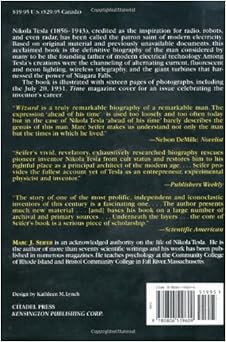From Publishers Weekly
Seifer's vivid, revelatory, exhaustively researched biography rescues pioneer inventor Nikola Tesla from cult status and restores him to his rightful place as a principal architect of the modern age. Based largely on firsthand documents including Tesla's writings, his patents and those of competitors, it credits the Croatian-born Serb, who moved to New York in 1884, with the invention of the induction motor, long-distance electrical power distribution, fluorescent and neon lights, the first true radio tube and remote control, besides making vital contributions to the technology underlying television, wireless communication, robotics, lasers, the facsimile machine and particle-beam weaponry anticipating the space-based "Star Wars" defensive shield. Though often depicted as a recluse, flamboyant nouveau-riche Tesla (1856-1943) lived in Manhattan's Waldorf-Astoria Hotel for two decades, and hobnobbed with architect Sanford White, Mark Twain, Rudyard Kipling, conservationist John Muir, mogul John Jacob Astor III, Swami Vivekananda. Yet the electronic wizard, who competed fiercely with Marconi and with his one-time employer Edison, became swamped in debt, abandoned by a world he helped create, ending his days in seedy poverty, a bitter, anorexic eccentric obsessed with feeding pigeons and avoiding germs. Seifer, who teaches psychology at Community College of Rhode Island, attributes Tesla's downfall partly to his megalomaniacal, neurotic, self-destructive tendencies, partly to a quagmire of litigation and also to his Faustian pact with his ambivalent benefactor, Wall Street financier J. Pierpont Morgan, to whom he relinquished control of several patents. Morgan, suggests Seifer, stymied Tesla's visionary scheme for a global, wireless power-distribution system because, if realized, it would jeopardize electrical, lighting and telephone monopolies. Seifer provides the fullest account yet of Tesla as an entrepreneur, experimental physicist and inventor. Photos.
Copyright 1996 Reed Business Information, Inc.
--This text refers to an out of print or unavailable edition of this title.
From Library Journal
Nikola Tesla is credited by many as the inventor of radio and should have received most of the credit for the development of modern electricity. Yet there is considerable confusion about his technical contributions and even more about his personal life. This book, by a professor of psychology at Bristol Community College and a member of the International Tesla Society, painstakingly documents Tesla's wide-ranging contributions. Born in Croatia, Tesla emigrated to the United States in 1884 and almost immediately began work on alternatives to what was then accepted as standard electrical technology. This brought him into conflict with Edison and later Westinghouse. The pattern of conflict continued for nearly 60 years, partially because Tesla was far ahead of his time, partially because he was erratic and off-beat, and partially because he was not an astute business partner. Seifer has analyzed extensive sources, many not previously used by other Tesla biographers, to provide a detailed interpretation of his life, but the fact that he also incorporates extensive handwriting analysis to arrive at several of his conclusions will certainly cause some reader concern. For larger science and biography collections.?Hilary Burton, Lawrence Livermore National Lab., Livermore, Cal.
Copyright 1996 Reed Business Information, Inc.
--This text refers to an out of print or unavailable edition of this title.







